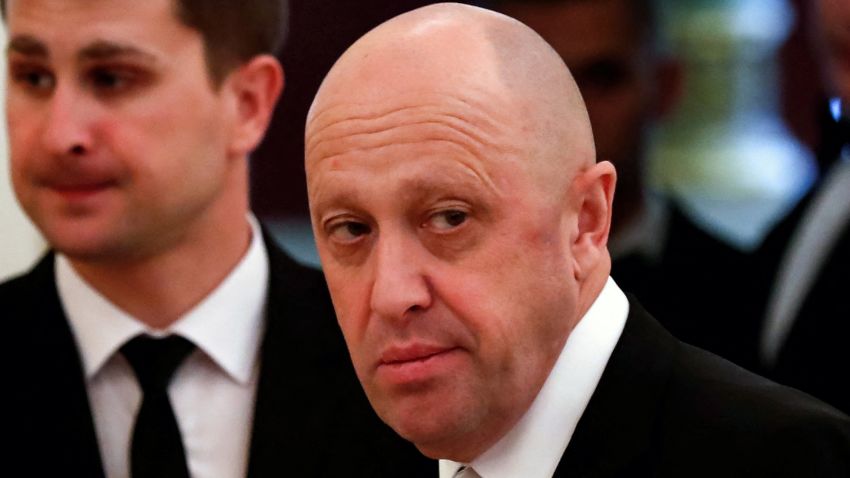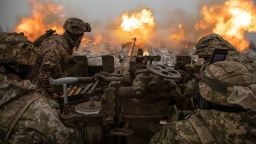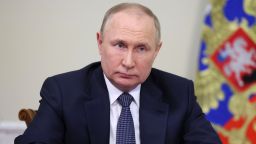Editor’s Note: Candace Rondeaux is the director of the Future Frontlines program at the New America Foundation and a Professor of Practice at the Center on the Future of War at Arizona State University. She has testified in Congress on Russia’s deployment of paramilitary forces in Ukraine and beyond, and is writing a book about the Wagner Group. Rondeaux is a Pulitzer Prize-winning journalist and former South Asia Bureau Chief for The Washington Post. This commentary draws on a research series focused on the Wagner Group, recently published by New America. The views expressed here are her own. Read more opinion on CNN.
Since the start of Russia’s full-scale invasion of Ukraine a year ago, the private military company Wagner Group has often been at the forefront of fighting, and remains one of the most potent forces on the battlefield today.

Its head, Yevgeny Prigozhin, an ex-convict and self-avowed financier of the Russian paramilitary, meanwhile, is alternately being talked of as a potential rival to Russia’s president Vladimir Putin or a target of assassination.
Either way, there are increasing signs that the Wagner Group and Prigozhin are paying a heavy price for their fealty to Putin and the wealthy Russian elites who help finance the paramilitary. And, for all the speculative hyperventilating about Prigozhin’s rise to power, several important questions remain unanswered.
How did a nation like Russia – with its top ranked military and nuclear arsenal – come to rely on the personal army of billionaire convict with no apparent battlefield experience?
Could Prigozhin really use the Wagner Group to vault himself into a government position or even replace Putin himself? And most importantly for global stability: how might the Wagner Group factor into future negotiations between Russia and Ukraine?
The answers to these questions hold grave implications for the trajectory of Putin’s war – and the future relationship between Russia, the United States and NATO.
These are also questions that the team of researchers that I lead at New America and Arizona State University have been researching for the better part of the last five years. What we’ve learned while uncovering the Wagner Group’s covert operations and Prigozhin’s shadowy business enterprises is that Prigozhin needs Putin as much as Putin needs him – at least for now.
The Putin-Prigozhin relationship
Prigozhin’s ties to Putin stretch back almost 30 years and it is that relationship that has helped Prigozhin build the Wagner Group brand.
Both men are native sons of St. Petersburg. Their social circles began to overlap after Prigozhin returned to the city in 1990, following a 9-year prison stint for robbery and assault, according to Russian court documents and press reports about his youthful crime spree.
That same year, Putin, still then an active reservist with the KGB, began working in St. Petersburg politics. And in 1991 the city’s late mayor Anatoly Sobchak gave Putin the job of overseeing the municipal gambling industry, along with a variety of other municipal projects.
By then, Prigozhin had started a successful hot dog stand business and with the help of an old school chum, Boris Spektor, had started to dip his toe in the city’s mobbed up casino business too.
Since then, Prigozhin’s star has risen alongside Putin’s, though Prigozhin has often operated in the shadows.
Known the world over as “Putin’s Chef,” for his previous role as the Kremlin’s official caterer, Prigozhin has been the subject of US government scrutiny for years. Prigozhin’s recent admission that he interfered in the 2016 US presidential election has also earned him the wrath of a global superpower.
For these reasons and more, how the US and its allies handle the Wagner Group and Prigozhin will without doubt shape NATO’s response to Russian military adventurism long into the future, and with it the global order.
Although it is unlikely that Putin and Ukraine’s president Volodymyr Zelensky will broker a peace deal anytime soon, it seems certain that the Wagner Group’s murky legal status and ties to the Kremlin will eventually factor into negotiations.
The Biden Administration’s National Security Council has estimated that Prigozhin spent $100 million a month to deploy 50,000 personnel to Ukrainian frontlines; a substantial number convicts recruited from Russian prisons. As a consequence, some in Congress are pushing legislation that would take existing sanctions a step further by labeling the Wagner Group a foreign terrorist organization – a move that would place Prigozhin on par with al-Qaeda’s deceased leader Osama bin Laden.
Yet, assuming Prigozhin is able to leverage his networks to mobilize fighters to the Ukrainian front and shore up Russia’s faltering military offensive, he will continue to be useful to Putin.
Prigozhin’s star rises
While it is highly unlikely Prigozhin would replace Putin, and the oligarch denies having political ambitions, there is a very real chance Putin could reward Prigozhin with a high-profile government post. The Russian president has a long-documented history of handing out plum government jobs to potential challengers whom he wants to sideline or control and stacking his cabinet with security agency veterans.
The higher Prigozhin rises, however, the harder he may fall. More recently there have been indications of the Kremlin clipping Prigozhin’s wings, reportedly ordering him to halt his public criticisms of the defense ministry as well as apparently shutting down the Wagner Group’s prison recruitment campaign. There has also been reporting that Kremlin has ordered state media to stop mentioning Prigozhin or Wagner by name, though Russian officials deny this.
Given Prigozhin’s political peacocking of late – including challenging Zelensky to an aerial dual – the oligarch surely realizes that the more time he spends in the spotlight, and the more battlefield wins for Wagner Group, the more difficult for Putin to kick him to the curb.
In fact, it may now be impossible to extricate Prigozhin’s fate and the status of the Wagner Group from the future trajectory of the war and stability in Europe. No matter what position Prigozhin holds, the more power he gains the more sway he holds among an increasingly militant faction of ultranationalists.
That is very bad news for Zelensky, millions of Ukrainian citizens and the world.
Wagner’s global influence
So what is to be done? While the Biden Administration’s recent designation of the Wagner Group as a transnational criminal organization will empower the US and its allies to go hard after Prigozhin’s shady networks, several practical pitfalls still lay ahead.
Chief among the challenges is the skepticism the US is already facing from African nations that have made common cause with Russia and the Wagner Group.
Then there is the problem of ostensible US allies like the United Arab Emirates, which has quietly backed Russia’s encroachments in places like Libya and Sudan. In a 2020 inspector general report, the Pentagon cited indications of possible Emirati financial backing for the Wagner Group.
UAE officials have denied those links. But as I and others have documented extensively, the Wagner Group used Russian designed and Emirati financed weapons in Libya. (While our findings do not provide conclusive proof of the alleged Emirati financial ties to the Wagner Group, they do add to the mounting evidence of UAE support for illicit mercenary activities).
In every single case, where the Wagner Group has a presence, its operations are facilitated by military-technical agreements between Russia and the host country in question. A tangled web of shell companies that connect back to Prigozhin in turn handles all the transactions.
Often these deals call for the sale of weapons and military services that cash-strapped countries in the Global South agree to buy from Russia in exchange for mining rights or oil and gas production shares.
All of which has not only made Prigozhin incredibly wealthy, it’s enriched authoritarian kleptocracies around the world.
When it comes to dealing with Prigozhin and the Wagner Group, it is best to focus on the long game.
Congress and its legislative counterparts in the United Kingdom and Europe should be moving more swiftly to ensure that relevant government agencies issue an authoritative public accounting of efforts to disrupt and expose the cartel that sustains the Wagner Group.
Solutions won’t come easy and bringing the Wagner Group to account will take time. But inaction is no longer an option.




